A DEDICATED LEADER FOR SOUTH CAROLINA AG
October 31, 2025 | 12 min to read

South Carolina growers reap decades of support and success from their agriculture commissioner and champion, Hugh E. Weathers.
South Carolina agriculture has enjoyed a passionate proponent in Hugh E. Weathers, who has served as South Carolina’s Commissioner of Agriculture since September 2004. Under his leadership, the South Carolina Department of Agriculture (SCDA) developed a variety of innovative and successful programs. “As agriculture in the state has changed with more fruit and vegetable crops being grown in our state, Commissioner Weathers has led the way in promoting these crops and the infrastructure needed to make them successful,” says Jeff Wilson, co-owner of Cotton Hills Farm, LLC, in Chester, SC.
Commissioner Weathers came from a dairy background, but gained a broad view of the industry before taking office through his involvement with Farm Bureau and his work in finance. He was born, and still resides, in Bowman, SC, and is a fourth-generation farmer. He graduated from the University of South Carolina, earning BS Degrees in Accounting and Finance. Upon graduation, he worked as a corporate banking officer with C&S National Bank before returning to Weathers Farms.
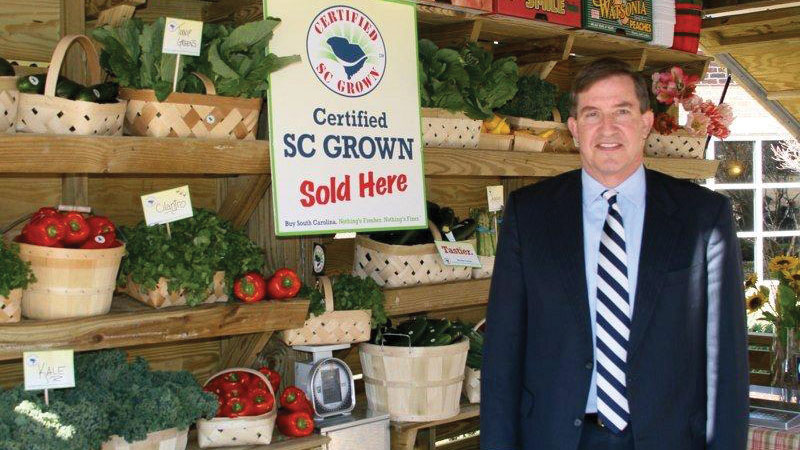
His family holds an important place in his life. He has been married for 42 years to Blanche (Gramling) of Spartanburg County, who grew up on her family’s peach farm. They have three sons, four granddaughters, and four grandsons. The Weathers are active members of Orangeburg First Baptist Church. “I’ve always had great respect for Hugh as a family man,” says Susan McAleavey Sarlund, executive director of the Eastern Produce Council (EPC) in New Providence, NJ. “He adores his family, and I always enjoy family updates from him.”
Living only a few miles from Weathers Farms, Ronnie Summers, president of SC Advocates for Agriculture and former chief executive of the Palmetto AgriBusiness Council (PABC) in Bowman, SC, has observed a man who values family. “He spends quality time with his family while still handling significant responsibilities at SCDA,” he says. “He recognizes the need for balance in his life. Part of what makes him a success in this regard is his faith, which he exhibits quite often and leads to the balance he lives out.”
Commissioner Weathers’ emphasis on developing connections has resulted in strong partnerships over his tenure. “Hugh has always done an excellent job of fostering the relationship between South Carolina ag and the EPC,” says McAleavey Sarlund. “Between my father (previous EPC executive director) and myself, there have been 35 years of consistency and mutual support and respect between EPC and SCDA.”
BUILDING A BRAND
Weathers is particularly known for his agency’s flagship program, Certified South Carolina. The Certified SC program, launched in May 2007, helps consumers easily identify and purchase South Carolina products while increasing market opportunities for farmers.
Lonnie Kelley, customer service and sales at Senn Brothers Produce in Columbia, SC, has been in a buying role for almost all of Commissioner Weathers’ term. “I especially got to see the differentiation of various state programs in my role with Food Lion in local produce sourcing working across 10 states,” he says. “Commissioner Weathers and Certified SC are head and shoulders above other programs in the Southeast.”
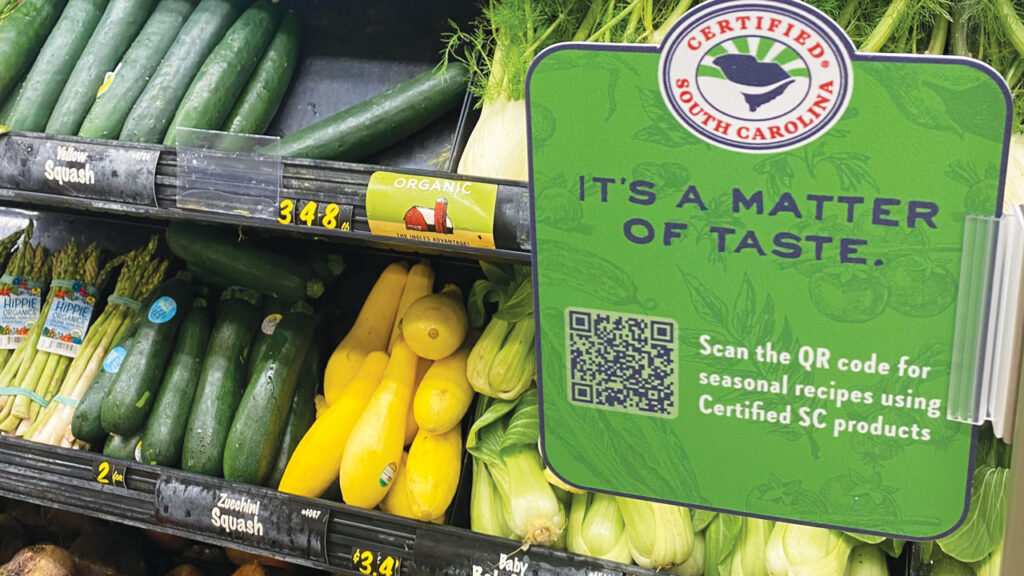
“This was his vision when he came on as commissioner,” says Chalmers Carr, owner of Titan Farms in Ridge Spring, SC. “The goal was to raise awareness for the agricultural goods produced in South Carolina. The program is successful because he’s never stopped fighting for South Carolina ag.”
Before Weathers took office, several attempts were made at state ag promotion programs, but none truly gained traction. “From the moment he stepped into his role, he committed himself fully to building and sustaining the Certified SC program,” says Charles Wingard, vice president of field operations for WP Rawl in Pelion, SC. “Under his leadership, the program has grown into a trusted and recognizable brand.”
Weathers took a studied approach before developing the program by contracting some initial market research. The research revealed that 90% of shoppers surveyed would purchase SC-grown products. However, 68% of those surveyed couldn’t identify South Carolina products from the competition. These findings gave direction to SCDA’s campaign.
Certified SC began with an industrywide push, driven by SCDA. “Commissioner Weathers went to the state legislature for funding,” says Carr. “Not only was he successful in getting it started, but he was able, year after year, to demonstrate success and continue getting funding. He has fought for taxpayer money justifiably spent on promoting an industry that is the backbone of the state.”
First steps of the program saw a logo reading “Certified SC Grown” appear in grocery stores, at roadside markets and in advertisements.
Cotton Hills Farm is among the many farms that have incorporated the Certified SC Grown logo into its labels. “Produce managers tell us their customers look for that label because they know SC Grown products are the best,” says JEB Wilson, co-owner.
EXPANDING TOOLS
Over the past 18 years, Certified SC activities have expanded from logo use to now include a wealth of promotional and marketing tools and opportunities. The department promotes Certified SC as a whole through social media, advertising, events, sponsorships, and more. Retail merchandising resources help retailers carry and promote South Carolina produce at peak ripeness throughout the year. The department also hosts the Certified SC Showcase, an annual trade show to connect buyers and producers with South Carolina grown products.
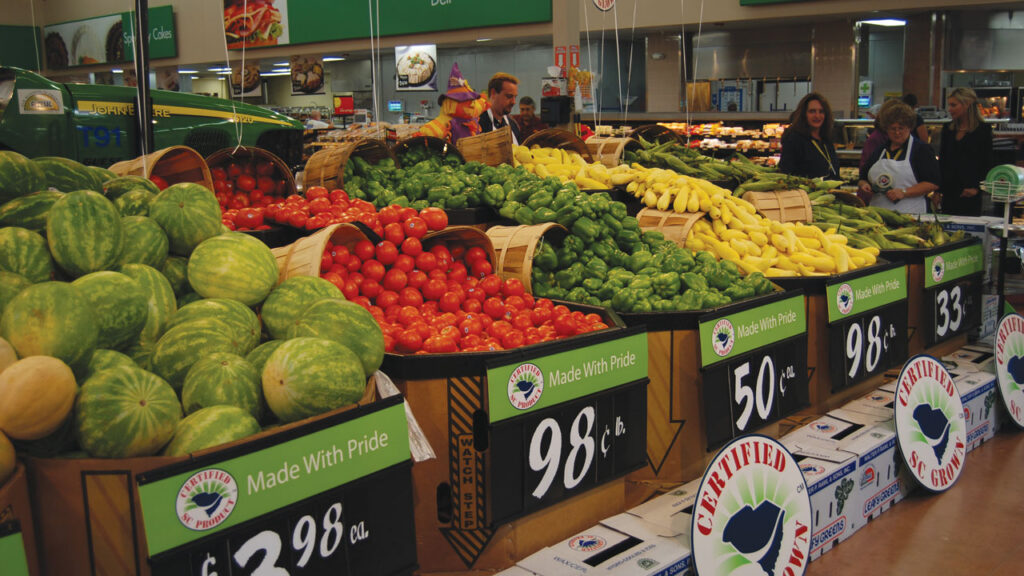
Commissioner Weathers has facilitated business by focusing on flavor and buyer linkages. “He has done a great job of promoting the taste of our produce and giving us an advantage,” says Jerry Watson, co-owner of Watsonia in Monetta, SC. “He really supported new business development, especially with chain stores, for our farms and South Carolina products.”
The launch of Fresh on the Menu and the South Carolina Chef Ambassador program were major milestones for the program — expanding its reach into foodservice. Through Fresh on the Menu, restaurants and chefs partner with Certified SC by sourcing at least 25% of their ingredients from South Carolina.
PROVEN SUCCESS
The Certified SC program has grown from 60 members when it started to 2,253 as of this year. According to a 2020 study by the University of South Carolina, Certified SC accounts for an additional $273.5 million in economic activity, 1,615 jobs and $51.2 million in labor income for South Carolinians annually, reflecting the positive returns of the branding effort.
Increased production acreage in vegetable crops also points to its success. The U.S. Department of Agriculture’s 2022 Census of Agriculture showed vegetable acreage in South Carolina was up 25% over five years earlier. The state now leads the nation in collard green, turnip green, and Southern pea acreage, according to the census.
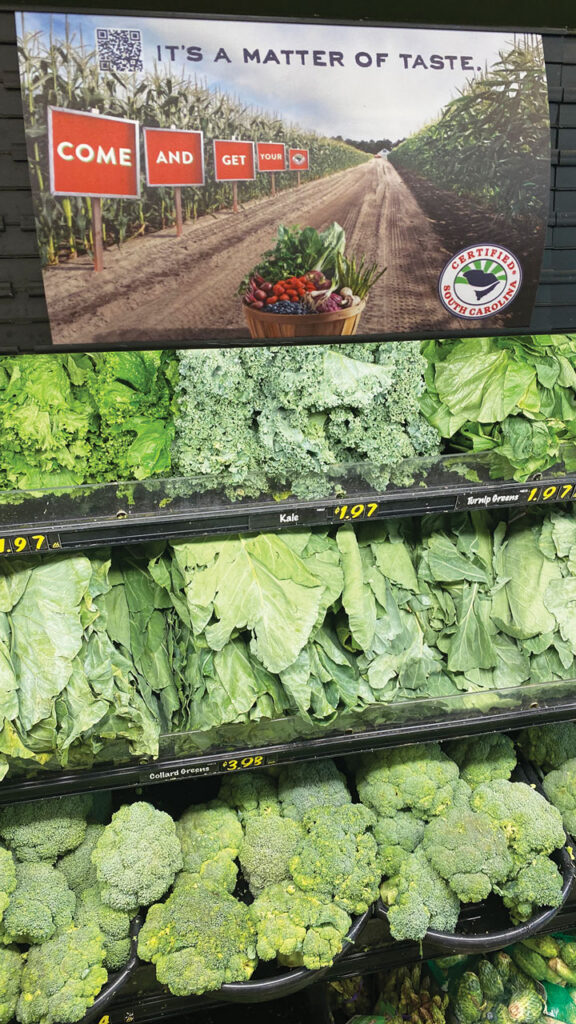
The Certified SC program has been incredibly valuable to farms. “It has not only helped bring greater awareness to South Carolina agriculture, but it has elevated the industry as a whole,” says Wingard of WP Rawl. “We see firsthand the impact of the logo on our packaging. The program has been an important tool in connecting with customers and reinforcing the strength and pride of SC agriculture.”
Wingard also credits the program with fueling growth beyond the state’s borders. “Much of South Carolina’s produce is marketed throughout the eastern U.S. and, over time, both buyers and consumers have come to recognize the Certified SC Grown logo as a trusted symbol of quality,” he says.
CONSISTENT LEADERSHIP
Weathers has provided visionary, steady leadership, according to EPC’s McAleavey Sarlund. “It’s been a pleasure to work with him because of the constancy and his continued involvement in the programs.”
He is also credited with expert team building at SCDA. “He knows how to pick a team,” says Watson. “He’s skillful at recruiting good people and has put together an excellent staff over the years.”
From the very beginning, Weathers has provided steady guidance, according to Wingard. “By making the program a priority, he ensured it had the structure, resources, and long-term vision to grow,” he says. “As a fourth-generation farmer himself, he truly understands the value of our work and the challenges we face.”
With his announced retirement, 2026 will serve as his last year in office.
Titan’s Carr expresses gratitude to both the Commissioner and his wife Blanche. “They are true role models of partnership,” he says. “Blanche has been so involved and supportive of Hugh. We offer a big thank you to both of them and everything they’ve done to support South Carolina agriculture.”
• • •
Q&A WITH COMMISSIONER WEATHERS
Produce Business had the privilege of speaking with Commissioner Weathers about his very effective career.
PB: Why did you feel it was important to start the Certified SC program?
South Carolina farmers are very independent and hardworking in producing food for the rest of us. It can be challenging for them to get off the tractor and be involved in marketing. When I started, we wanted to develop something that would serve as a connection between those farmers and those who consume what the farmers produce.
PB: What were your goals and expectations at the time you started?
To make better connections between farmers and consumers, give the industry more of a face in the programming, and pave the way for more support from the consuming public when there were issues facing agriculture. As an example, not long after we began Certified SC, we had some Right-to-Farm legislation make it through our General Assembly and into law. Now, its passage may not be directly related to our program, but the easier you make it for people to associate with farming, the easier it is for them to support other issues affecting the farmers.
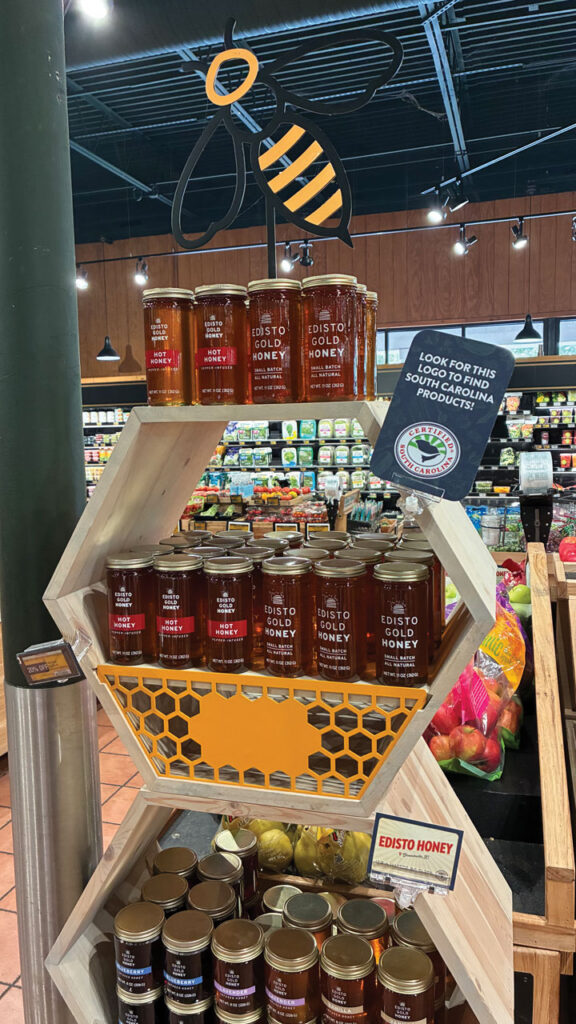
PB: Has Certified SC grown beyond what you first thought?
It’s expanded vastly. When we first began and over the years periodically, we’ve done consumer research to see if it’s working — if people recognize the program. Out of the gate, it was marginal. But our more recent research shows over 80% of the consuming public recognize Certified SC Grown as the brand/logo to pick to support local farmers.
PB: What are other programs are you proud of establishing?
I’m especially proud of our ACRE program because for someone with a new idea in agriculture, that program may be their only financial support, along with their own savings, to move their idea forward. I’m gratified that it operates in that space for the smaller entrepreneur. I’m looking forward to seeing the innovation in ag that comes from this program.
PB: What has motivated you over the last 20 years?
From time to time, I’ve had farmers and restaurants make a point to tell me personally just how Certified SC has impacted their economic survival. For example, a prominent caterer told me that they made the decision to use as much South Carolina product as possible, and it’s made all the difference in seeing their business thrive. To hear those stories and feel like it’s making a difference is the motivation to keep going.
• • •
Beyond Certified SC
Commissioner Weathers has spearheaded other major advances during his tenure.
Over the years, South Carolina Commissioner of Agriculture Hugh Weathers has emphasized the importance of support and diversification for farm businesses and is credited with growing the state’s agriculture industry. Under his leadership, the State Farmers Market was relocated in 2010 to a new state-of-the-art facility. The new Lexington County campus includes a multi-purpose event facility — the T. Ashton Phillips Conference Center. In the years since its move, the campus has expanded several times.
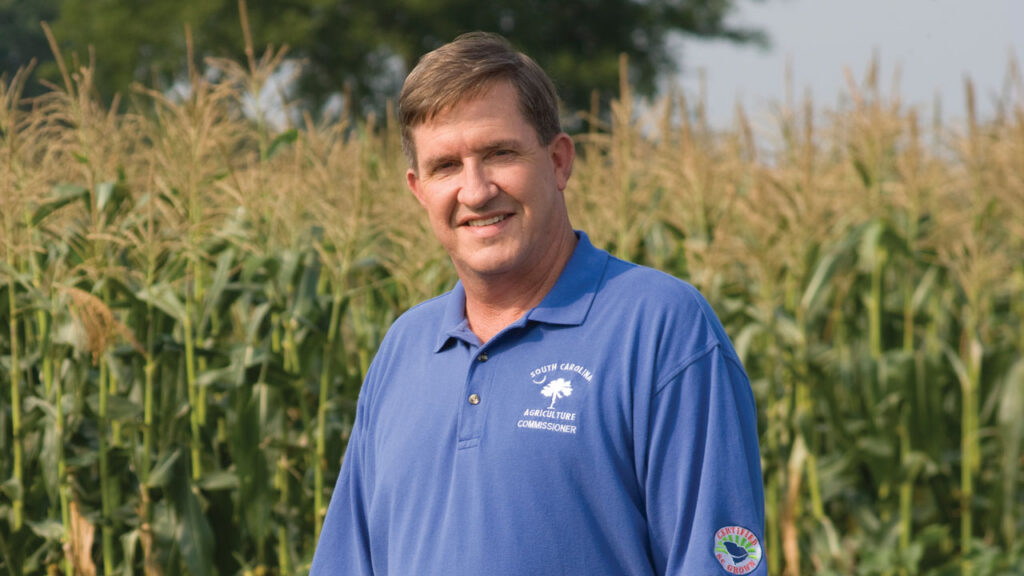
Early upon becoming Commissioner of Agriculture, Weathers had the vision to initiate South Carolina Advocates for Agriculture to promote South Carolina agriculture. “The Board of Directors consists of representatives from key agriculture groups within the state along with farmer representatives from various commodities and state regions,” says Ronnie Summers, president of SC Advocates for Agriculture. “This board, advised by the SCDA, has made a major difference in many projects in South Carolina such as the flood of 2015, which was disastrous for the state’s farmers. It also helped as farmers and commodity end users encountered major obstacles during COVID in 2020 and 2021.”
Advocates for Agriculture has distributed about $1.8 million since it was formed, says Summers. “Hugh’s vision has led to this very successful organization, filling its mission of promoting and supporting South Carolina agriculture.”
In 2009, Weathers introduced the 50 by 20 goal to grow the economic impact of South Carolina agribusiness from $34 billion to $50 billion by the year 2020 — a goal the industry actually exceeded by 2020. The annual economic impact from agribusiness now exceeds $51.8 billion, and the sector employs 260,000 South Carolinians.
In 2018, with Weathers’ guidance, the department introduced the Agribusiness Center for Research and Entrepreneurship (ACRE), an industry-driven ag research and resource initiative. ACRE houses a unique research platform devoted to addressing specific challenges, including key fruit and vegetable research to help South Carolina farmers become more profitable, such as heat-tolerant varieties of popular vegetable crops. It has also given grants and business development training to more than 140 agribusinesses in South Carolina, many of them focused on produce.
Under Weathers’ leadership, SCDA stepped up in 2024 to take on many of the food safety duties previously handled by the South Carolina Department of Health and Environmental Control. With that transition, the SCDA doubled in size and now handles all food safety regulation other than meat and poultry inspection. “With most food safety matters now handled within the SCDA, the Commissioner took on a significant task of placing the right people in the right seats to make sure food safety not only was retained but was improved,” says Summers. “Hugh’s leadership in this matter has proven to be a difference-maker.”
South Carolina stands out in food safety because it provides programs to help growers get GAP certified, explains Lonnie Kelley, customer service and sales at Senn Brothers Produce in Columbia, SC. “SCDA provides both coaches and inspectors,” he says. “Many states have neither of these due to budget cuts or lack of priority and therefore struggle to get small farms GAP certified.”
Susan McAleavey Sarlund, executive director of the Eastern Produce Council (EPC) in New Providence, NJ, points to the commissioner’s support of other industry programs. “Hugh really got behind the New York Produce Show when it started,” she says. “He has been a consistent supporter and a faithful exhibitor. South Carolina has always had a booth at the show. He has been a real friend to the EPC and what we’re doing.”
In addition to promotion in South Carolina and the U.S., Weathers actively pursued activities to build overseas markets for South Carolina, according to Kelley. “He worked with all three South Carolina governors during his time to aggressively market South Carolina produce around the world,” he says.
The commissioner serves on numerous local, state, and national committees and boards. In 2011, he was inducted into the South Carolina Dairy Hall of Fame and has received numerous other awards and recognitions.

